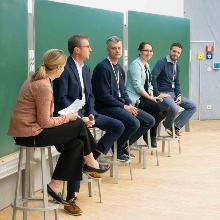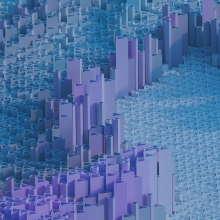Department at "Engineering Intelligence - Cyber Valley at University of Stuttgart"
At the end of November, the University of Stuttgart invited guests for the two-day event "Engineering Intelligence - Cyber Valley at University of Stuttgart"–"open to anyone interested in finding out about and experiencing first-hand the exciting projects and initiatives in the fields of artificial intelligence, intelligent robotic and intelligent systems at the University of Stuttgart." Members of Department of Computer Science took the opportunity to present their expertise and research focuses in detail.
Institute for AI on the podium in the lecture hall
On the morning of November 29, representatives of the AI Institute gathered on the podium in lecture hall V47.02 to discuss "The Future Made by AI"–in a slightly controversial manner. Moderated by Dr. Rubina Zern-Breuer (TRACES), Dr. Luiz Chamon warned of job losses, while Prof. Mathias Niepert predicted new job profiles. Prof. Alina Roitberg looked confidently into the future of AI-supported assistants, for example for blind or frail people. Finally, Prof. Steffen Staab reflected on transparency and the (in)accountability of technical systems.
Inaugural lectures, AI applications and outlooks
In the following lectures, the experts from the Institute for AI went into even greater detail. Prof. Roitberg and Prof. Staab also delivered their inaugural lectures. More on this later.
Prof. Niepert spoke about "Machine Learning for the Simulation Sciences" and clearly demonstrated how classic experimental set-ups can be combined with AI and thus significantly accelerated. This would allow new drugs to be developed faster than before. Dr. Luiz Chamon outlined the development "From Artificial to Engineered Intelligence".
As a representative of VISUS, Alexander Achberger presented his work, in particular on "STRIVE: String-Based Force Feedback for Automotive Engineering".
Inaugural lecture by Prof. Staab
Bridging Knowledge Representation and Machine Learning for Intelligent Systems
Every form of machine learning is based on data and conclusions, Prof. Staab stated at the beginning of his inaugural lecture "Bridging Knowledge Representation and Machine Learning for Intelligent Systems". The following remarks revolved around various approaches to representing knowledge and, of course, the question of how best to integrate these representations with machine learning and transform them into even more intelligent systems.
At the end of his inaugural lecture, Prof. Staab finally announced a mailing list: ai-news@ki.uni-stuttgart.de. Anyone who wants to stay up to date on the topic of AI can subscribe and participate here. Students, researchers and lecturers are particularly welcome to join.
Inaugural lecture by Prof. Roitberg
From Representation to Action and Intention: Learning to Perceive Humans in a Changing World
Is the camera moving or is the person in front of it moving? Prof. Roitberg discussed questions of this kind in her inaugural lecture entitled "From Representation to Action and Intention: Learning to Perceive Humans in a Changing World". The professor explained how technical systems react to and perceive changing environmental conditions. Prof. Roitberg's vision: transferring the described models into potential applications, such as technology for elderly assistance or medical diagnostics.





